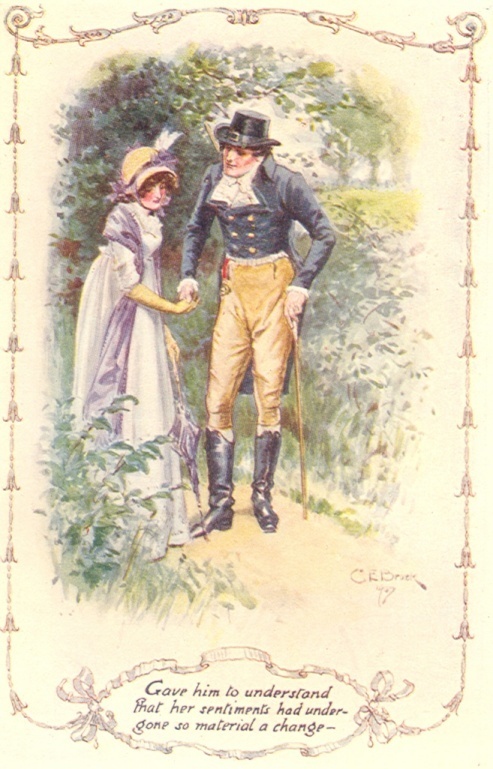Pride & Prejudice, ch. 58: Express Yourself
It is love.
Next chapter—
Okay, okay, I kid. Honestly, the love declaration is perhaps the least interesting aspect of this chapter, at least in the analytic sense. But let’s spend a sentence or two reveling in the mutual love confession of our two favorite imperfect characters, who refuse to let a few intensely awkward minutes get in the way of securing lifelong happiness. Let’s squeal at Darcy’s seductive earnestness as he re-proposes (it’s like he kept it on ice just for this occasion). Let’s breath a sigh of relief at the return of Lizzy’s good humor, grounded only by her newfound humbleness, now that she knows that Darcy really has been in love with her this whole time.
I especially like the emphasis on Lizzy’s initial shyness. On the surface, this seems highly out of character, but only if you discount the context. Her behavior here stands as a stark contrast to her (mostly justifiable) behavior during the first proposal; in fact, I don’t think it’s a stretch to suggest that this is a conscious choice on her part. And it allows for one of the most romantic lines in the chapter, if not the entire book: “Had Elizabeth been able to encounter his eye, she might have seen how well the expression of heartfelt delight, diffused over his face, became him; [...] he told her of feelings, which, in proving of what importance she was to him, made his affection every moment more valuable.” After proving herself adept at debating, she has learned to listen properly as well. It’s such a refreshing flip of their initial encounter, wherein Darcy’s physical appearance is the focus before he ruins it by speaking in short, rude sentences.
Darcy explains that his aunt’s exploits resulted in his present pursuit of Lizzy’s hand. Apparently, Lady Catherine, in conveying Lizzy’s “perverseness and assurance,” hoped to “obtain that promise from her nephew which [Lizzy] had refused to give.” And what a majestic backfire that turned out to be! It gave Darcy the “hope” that Lizzy’s feelings for him are mutual, as he figured that “had you been absolutely, irrevocably decided against me, you would have acknowledged it to Lady Catherine, frankly and openly.” Lizzy wholeheartedly agrees. Isn’t it nice to know that they can be just as entertaining when they agree as when they argue?
Then Darcy reveals the extent of the soul-searching he has done since the Night of the Botched Proposal. “[M]y behavior to you at the time had merited the severest reproof,” he says. “Your reproof … I shall never forget: ‘had you behaved in a more gentleman-like manner.’ [… ] You know not, you can scarcely conceive, how they have tortured me.” He also admits that his letter reflects, or ought to reflect, badly on him, as he initially wasn’t aware of his agitation and “bitterness” while writing it. Lizzy, perhaps uncomfortable with the severity of his self-reproof, suggests that he stop focusing on bad memories. But he argues that these “[p]ainful recollections … ought not be repelled,” as he finds them instructive as he strives to alter his behavior for the better. His parents taught him to care for his “family circle” without giving those outside it due consideration. But then “dearest, loveliest Elizabeth” happened. “You showed me how insufficient were all my pretensions to please a woman worthy of being pleased,” he adds, and it’s that extra wording about her worth that really shows that he’s breaking the habit of “think[ing] meanly of [others’] sense and worth compared with my own.”
To her everlasting credit, it doesn’t even occur to Lizzy to revel in the fact that she ignited this change in Darcy. Instead, she recognizes her own defects: “My manners must have been in fault …. [B]ut my spirits might often lead me wrong.” She admits that she wasn’t expecting—that she didn’t feel entitled to—the “extraordinary politeness” Darcy showed her during the Pemberley visit.
And how absurdly cute is it that Darcy attempts to calculate the length of time it took for him to decide to court her? “I believe in about half an hour after I had seen you,” he says, he realized that he had caught feelings again. This Darcy guy, man.
On the way back to Longbourn, they discuss Bingley and Jane. Darcy admitted to Bingley, the night before he left Meryton, that he did wrong in convincing Bingley that Jane wasn’t into him and that he helped ensure that Jane and Bingley didn’t see each other in London. “[Bingley’s] diffidence had prevented his depending on his own judgment,” Darcy explains, though Bingley’s modesty didn’t stop him from getting “angry” at Darcy for this secrecy. He has, of course, since forgiven him. Lizzy holds back on cracking a joke about Bingley’s yielding to Darcy’s advice, but she reflects that “he had yet to learn to be laughed at, and it was rather too early to begin.” I love this, as it shows two things: a) that Lizzy is sensitive to Darcy’s current state of mind and b) she does want to show him that a little self-deprecation doesn’t hurt.
And really, what more is there to say? Lizzy and Darcy have met their highest proficiency level. They’re ready to start their lives together. Just three more chapters to go …
Sooner than later: Lizzy breaks the news to her family and tries not to let the disheartening reactions get her down.



Great job on this. I just discovered The Republic of Pemberley & made my way here. Thanks.
ReplyDelete